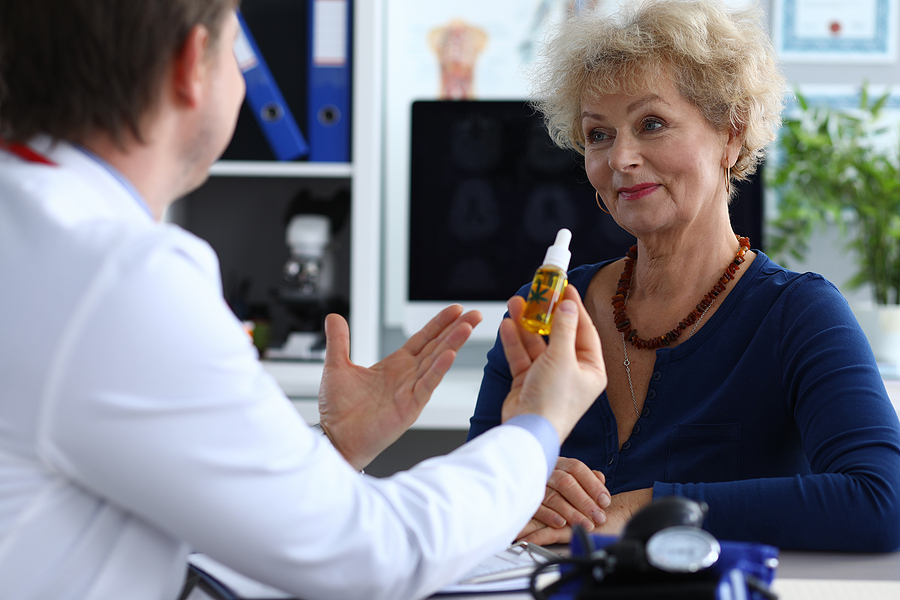Medical Marijuana Benefits for Elderly Adults
Category:

The relatively recent availability of marijuana products has opened new opportunities for effective treatment of a variety of conditions. Hemp and cannabidiol (CBD) products were federally legalized in 2018, which means CBD products are now legally available in 47 states. Nearly as many states have legalized medical marijuana.
With the latest wave of legalization, researchers are now more intensely exploring relationships between marijuana and a variety of different conditions that affect the elderly, including connections between marijuana & dementia. Outside of future research, it’s already fairly common knowledge that marijuana for pain in elderly individuals can sometimes be an effective alternative to opioids. But like any relatively new treatment options, there are always benefits and risks to consider. What kind of things might that include?
Marijuana & Seniors – The Basics
Marijuana is made up of several components, flavonoids, terpenes, and countless others. The most well-known is tetrahydrocannabinol (THC), which is the component with intoxicating effects. Additionally, using marijuana for pain in elderly adults has been proven a medically effective way to treat certain types of pain. It can be especially useful for pain related to inflammation, like arthritis.
Marijuana has been proven to be less addictive than anxiety drugs and opioids, and there has never been a reported death from medical marijuana. However, the long-term effects of marijuana haven’t been studied very carefully. Especially around older adults, who have kept their consumption secret because of the legal status and stigma.
It’s also worth knowing that marijuana products can increase heart rate and blood pressure. It can interact with certain types of drugs, especially anti-seizure medications and blood thinners. And it can also affect anesthesia and pain management if you plan on having surgery.
Medical Marijuana Benefits for Elderly
Similar to THC, CBD is another component found in marijuana plants. It doesn’t have any of the intoxicating effects, but it does have many of the same properties as THC. For instance, cannabinoids can suppress pain, help with nausea and vomiting for cancer patients, provide treatment for glaucoma, and alleviate anxiety disorders or eating disorders.
CBD in elderly adults has been used to manage Parkinson’s, Huntington’s Pick’s disease, and many other kinds of chronic conditions. Researchers have found CBD is also useful for helping sleep quality and treating insomnia, which has made using CBD for sleep in elderly populations quite common. And some research has found cognitive function can even improve from using cannabis because of factors like improved pain control and higher quality sleep.
Marijuana Dementia Prevention: Fact or Fiction?
There has been a small amount of preliminary research that suggests using medical cannabis for dementia can have positive results. This is a fairly contentious issue both among the scientific community and among the states responsible for legislating. According to the Alzheimer’s Society, there’s no evidence suggesting CBD oil is able to prevent or reverse dementia. Additionally, there is no FDA-approved CBD drug for treating dementia.
However, there are studies that show some of the symptoms of dementia can be reduced with CBD, especially aggressive and agitated behaviors. Some states do consider Alzheimer’s an approved condition for medical marijuana, and the CBD dementia connection is still being studied with interest.
It’s also worth noting as of 2021, Medicare and Medicaid won’t cover medical marijuana or CBD derivatives. And currently, CBD products are not legal in South Dakota, Nebraska, or Idaho
Should You Try It?
There are pros and cons to everything, including CBD. If you do decide it’s worth a try, there are countless ways to find CBD: drinking, eating, smoking, or even applying it in the form of a cream. For medical marijuana, many seniors use vaporized oil or an e-cigarette because it’s less harsh than smoke.
Like with other kinds of medication, when it comes to hemp for seniors, you typically want to start with the lowest effective therapeutic dosage, which can discourage the development of drug tolerance. But like any medical decision, it’s a good idea to talk to a doctor beforehand.
Subscribe
Date: April 20, 2021
Category:


